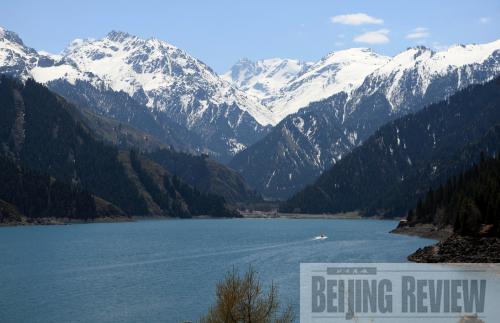|
 |
|
CRYSTAL CLEAR As one of Xinjiang's three spots honored with the national ranking of a 5A tourism site, the plateau Tianchi Lake attracted 973,000 tourists last year (JIANG XIAOYING) |
Sixty-year-old Niyaz Rehep never thought he could be more than a grape farmer until five years ago. His family has been living in Turpan, an oasis city in Xinjiang Uygur Autonomous Region, for centuries.
But in 2004, the local government told residents of this city, renowned for grapes that are hailed as China's sweetest and its 4-mile valley that is bathed in sunshine, that they could dig out their first bucket of gold by opening family restaurants for tourists.
The valley, a lush stripe of green in barren desert surroundings, was gaining an international reputation as one of the earliest developed tourism destinations in Xinjiang. Residents there, though, who are 95 percent Uygur, had been suffering from low incomes that barely provided for essentials and left very little for savings afterwards.
But they worried about the government's plan. They thought they might lose their hard-earned grape money to a lack of diners, even if the government fully subsidized the interest on their bank loans.
Despite their concern and lack of experience, Niyaz and nine other valley farmers decided to give it a go. With 30,000 yuan ($4,412) in bank loans and another 30,000 yuan of his own, he started his family business in 2004. "Back then, I reassured myself the worst scenario was that I would have to pay off the loans from selling my grapes," he said.
To his delight, though, Niyaz's business has not lost a penny since its inception and has seen a revenue surge in the last three years thanks to booming tourism. During the three-day national holiday on May 1-3 this year, his 150-seat family restaurant was overbooked and sat around 500 people. He hired a chef and three waitresses and said he earned 6,000 yuan ($882) in those three days, equaling his net annual income from his 0.13-hectare vineyard. He paid off the business loans in two years.
Now the grape valley has more than 100 family restaurants, many of which also sell local fruits, vegetables and souvenirs to tourists.
With a plan to expand his restaurant and build a parking lot for diners this year, Niyaz is confident about the upcoming tourist season that spans from June to October. His optimism is well founded, as governments at all levels in Xinjiang Uygur Autonomous Region are trying to boost tourism revenue despite the negative impact of the international financial crisis.
"Xinjiang receives over 20 million tourists every year, surpassing its permanent population. We hope to double the number of tourists to 40 million a year and bring in a million foreign tourists in the next few years," said Inam Nasirdin, Director of the Xinjiang Tourism Administration. He said his administration spent 1 million yuan ($147,000) on a May promotional tour to the Central Asian countries that border Xinjiang.
Improved facilities and services
Inam used to have mixed feelings toward journalists. While he enjoyed reading travel stories on Xinjiang's tourism destinations, he was once so depressed by reports criticizing poor tourist facilities that he could not sleep at night.
"While we were blessed with such a beautiful environment and natural views, our facilities and services for tourists, including public lavatories, catering services and roads around tourist spots, used to be horrible," said Inam.
With melted snow from more than 5,000-meter-high mountains as its source, Tianchi Lake has developed from an unknown location 30 years ago to one of the best-known tourist spots in Xinjiang today. Ranked as a 5A tourism site in 2007, the highest ranking for a tourism destination in China granted by the National Tourism Administration, the lake attracted 973,000 tourists from around the world last year.
Inam said that at one point, however, the spot's management and facilities were totally overstrained by tourists. Horse excrement from tourist rides, which are randomly offered by local herdsmen, littered the ground everywhere and a strong urine smell hung in the air. "Foreigners used to tell me that the food in Xinjiang was wonderful and people here were hospitable. Their only complaint was that the restrooms smelled too bad to enter," Inam said.
Now all the horses for tourist rides near Tianchi Lake are kept at an equestrian center, where people pay a standard price for rides through a set zone. To solve the lavatory problem, the autonomous region government in 2008 began investing 30 million yuan ($4.4 million) annually to build 300 star-rated public lavatories at tourism destinations and highway stops across the area.
The campaign to upgrade Xinjiang's tourism facilities and services also includes the construction of star-rated hotels and the training of multilingual tour guides. Now Xinjiang has 12 five-star hotels, growing from eight in 2006. The autonomous region's tour guides have grown from fewer than 20 in 1978 to 10,000 today. They offer services in Chinese, Uygur, English, Japanese, Korean and Russian.
| 